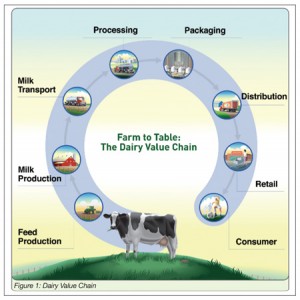Upon the lecture of the CSR( Corporate Social Responsibility) and Sustainability and the news of the recent Taiwanese Gutter Oil Scandal, I begin to ponder the negative external cost the corporations, especially the ones that are closely related to human daily life such as food industry, could cause by considering the societal benefit as the periphery instead of the core. The mindset does not bring business and society back together. In order to create shared values that will not only create economic value for the company but also the value for society, business must reconnect their objective with social progress, in an environmental and economically sustainable way.
Food safety and sustainability are closely interrelated; in addition to generating profit companies must consider the importance of social justice and the consequences of unscrupulous practicing. The recurring food safety scare in Taiwan is a failure of the food corporations to recognize and operate in the societal and national interest. Now after six countries and areas have officially banned imports of Taiwan food products, the government eventually addresses the measures to eradicate unethical food, including heavier fines and separate import process for animal feed and greater oversight over recycled edible oil. However, these regulations are merely measures to prevent corporations from unethical practicing, in order to reconnect the businesses with the society and contribute to the economic value of the society. Addressing social harms does not necessarily create internal cost to the businesses. Opposite, the positive brand recognition and reputation will attract more potential customers, even expanding to the massive global market.
 To eradicate unethical food manufacturing from the root, an organization such as Food Safety Operating Committee (FSOC) should be established to maintain consumer confidence in food safety while reducing the risk of reputation damage in food industry. To guarantee the sustainability and the social benefit, a life cycle approach will be enforced and introduced to food companies, assisting them to understand the correct procedures of creating sustainable and environmental friendly food.
To eradicate unethical food manufacturing from the root, an organization such as Food Safety Operating Committee (FSOC) should be established to maintain consumer confidence in food safety while reducing the risk of reputation damage in food industry. To guarantee the sustainability and the social benefit, a life cycle approach will be enforced and introduced to food companies, assisting them to understand the correct procedures of creating sustainable and environmental friendly food.
Works Cited:
“A Life Cycle Approach to Food Safety and Sustainability” by Gail Barnes, September 2011
http://www.foodsafetymagazine.com/magazine-archive1/augustseptember-2011/a-life-cycle-approach-to-food-safety-and-sustainability/

